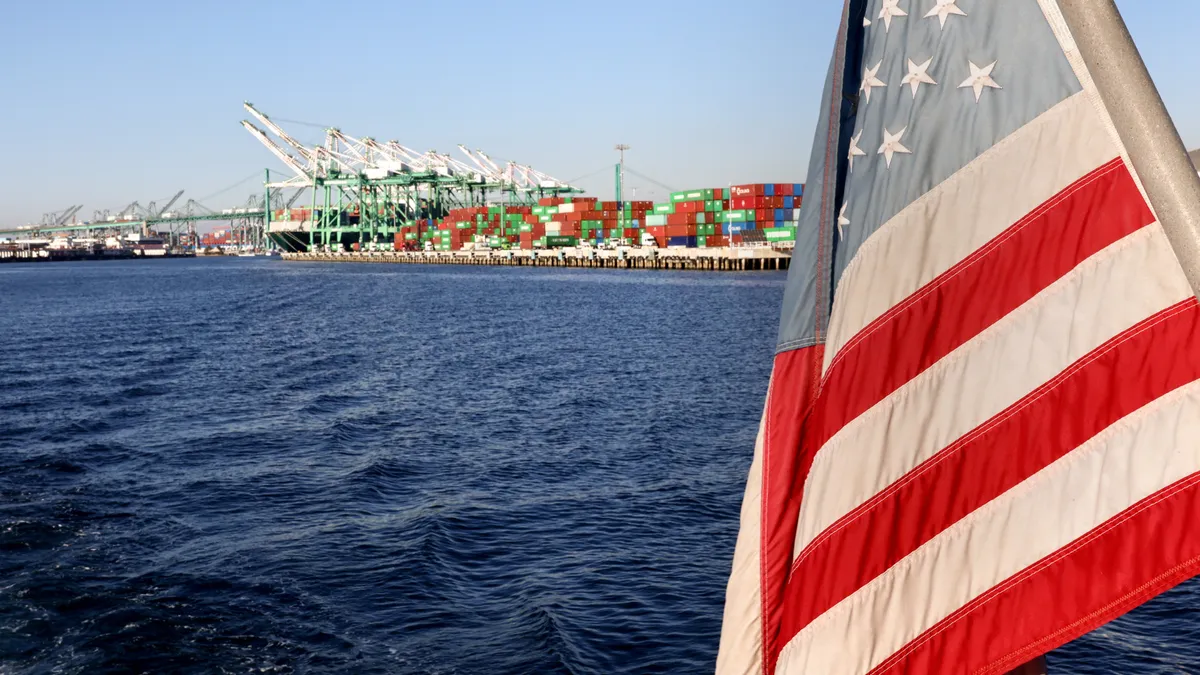Editor’s note: This story is part of an ongoing series diving into the opportunities and challenges supply chains face in 2023. Read the rest of the series here.
The nation's top ocean regulator is preparing to ramp up investigations into carriers this year following a tumultuous two years of congestion and high fees in the shipping industry.
The Federal Maritime Commission is currently working through more than 200 complaints against carriers, Commissioner Carl Bentzel said in an interview with Supply Chain Dive. And despite easing congestion at U.S. ports, shippers continue to note that they are being denied cargo space and facing rising detention and demurrage fees.
"When [a] delay is manageable, it tends to take away a lot of the issues related to both detention and demurrage and other issues," said Bentzel. "But we haven't seen it yet."
Disruption lingers even as congestion eases
Complaints are still coming in even as freight rates plummet and port congestion disappears. Transpacific ocean rates to the U.S. West Coast dipped below 2019 levels, according to Freightos.
But even with lower rates, shippers are still seeing some of the same issues that they saw in 2021 and most of 2022. Bentzel said the agency is prioritizing rising demurrage and detention fees in addition to intermodal chassis refusals and instances where ocean carriers deny vessel space to shippers.
"There's a bunch of cats and dogs that I'm looking at," he said.
One of the top complaints from shippers continues to be rising demurrage and detention fees, which are implemented when cargo is stored on cargo docks for longer than a set period of time. The agency saw close to $2 billion in detention and demurrage complaints in 2022, and Bentzel said that carriers have already refunded $700,000.
The Ocean Shipping Reform Act requires carriers to provide more details on detention and demurrage charges, in addition to directing the FMC to clarify “reasonable rules and practices” around the fees. The FMC aims to take a balanced approach to addressing demurrage complaints, with Bentzel noting that fees are sometimes necessary to help cargo flow and reduce congestion.
"They [ports] are not storage facilities," he said.
Beyond demurrage, Bentzel noted that the FMC is also investigating issues related to intermodal chassis. The commissioner said there have been instances where shippers were unable to use their own equipment at rail terminals.
"This is a circumstance where there are no equipment [at terminals] and they want to bring in their own equipment," he said.
New funding to provide enforcement boost
The FMC is set to receive a much-needed financial infusion, which Bentzel said will greatly help the agency speed up investigations and address shippers complaints.
While the FMC has received over 200 charge complaints from shippers, it only has six investigators. The agency had struggled to address an influx of complaints during the pandemic when shipping congestion created ripple effects throughout global supply chains.
To support the agency's staffing constraints, the Ocean Shipping Reform Act is adding approximately $6 million more a year to the FMC's budget, which will help it reach its goal of hiring about 128 to 170 more personnel. Many of those hires will be for investigators, attorneys and other enforcement positions.
While Bentzel said the new funding will provide a boost, the agency overall remains strapped for resources as it looks to comply with some of the major changes under OSRA. Besides detention and demurrage, the FMC is still looking to define what constitutes unreasonable refusal of vessel space in addition to setting guidelines for anti-retaliation and studying how the U.S. uses intermodal chassis.
"We're a little underpowered in terms of staff to do exactly what we would like to do," Bentzel said. "So we'll be stressed, trying to comply with all of the deadlines that are imposed in the act.














